Wicked
 for some scary action, thematic material and brief suggestive material.
for some scary action, thematic material and brief suggestive material.
Reviewed by: Alexander Malsan
CONTRIBUTOR
| Moral Rating: | Offensive |
| Moviemaking Quality: |
|
| Primary Audience: | Adults Young-Adults Teens |
| Genre: | Musical Fantasy Adaptation |
| Length: | 2 hr. 40 min. |
| Year of Release: | 2024 |
| USA Release: |
November 22, 2024 (wide release) DVD: February 4, 2025 |
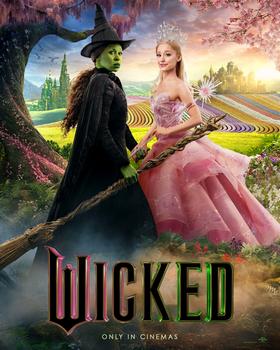

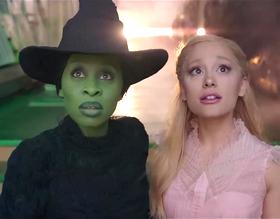
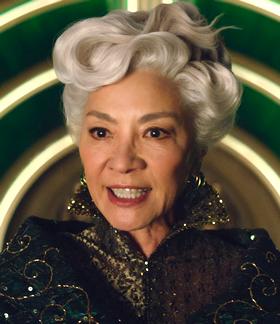
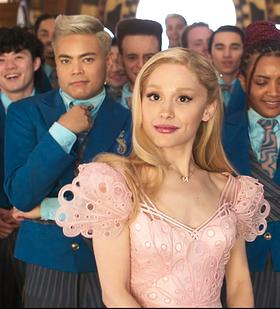
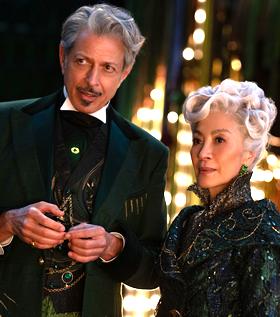
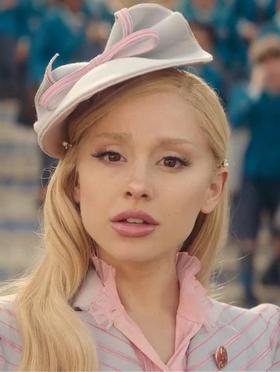
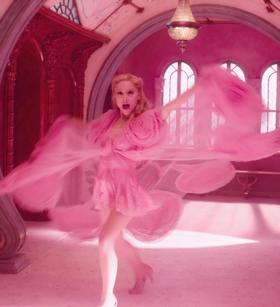
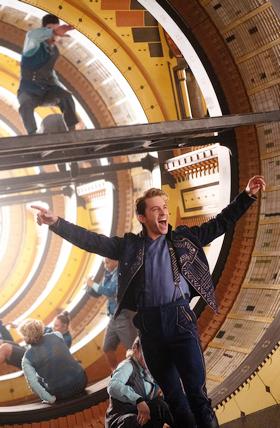
“Oz the Great and Powerful” (2013)
“Legends of Oz: Dorothy’s Return (2013)
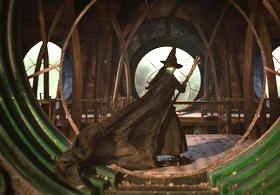
About WICKEDNESS from God’s point of view
Fantasy witches versus witches of the Bible
Main character in “Wicked” is a passionate political activist
Social outcast finding empowerment and self-confidence in the midst of social hostility
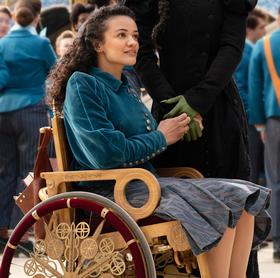
Paraplegic character becomes the Wicked Witch of the East
What does the Bible reveal about ADULTERY?
GAY—What’s wrong with being Gay?
What about Gays needs to change? It may not be what you think.
| Featuring |
Cynthia Erivo … Elphaba Thropp Ariana Grande (Ariana Grande Butera) … Galinda Upland / Glinda the Good Peter Dinklage … Doctor Dillamond (voice), a goat and a history professor Jonathan Bailey … Fiyero Tigelaar, a Winkie prince Jeff Goldblum … Wonderful Wizard of Oz Michelle Yeoh … Madame Morrible Bowen Yang … Pfannee of Phan Hall Ethan Slater … Boq Woodman, a Munchkin Marissa Bode … Nessarose Thropp, Elphaba’s paraplegic younger sister / Wicked Witch of the East See all » |
| Director |
Jon M. Chu |
| Producer |
Marc Platt David Stone See all » |
| Distributor |
“No one mourns the wicked! No one cries they won’t return!” proclaim the munchkins of munchkin land as they celebrate the death of the Wicked Witch of the West (Cynthia Erivo). Glinda hesitantly agrees with the munchkins, but deep down she knows that not everything is as it appears. “Are people born wicked? Or do they have wickedness thrust upon them? After all she had a mother and a father as all individuals do.” Indeed the story of the Wicked Witch is one that surprises the munchkins.
A long time ago, two individuals had a secret relationship, unbeknownst to their spouses they were married to. These two individuals flirted, kissed passionately and also drank green elixir, a lot of it. The result of this relationship led to the birth of Elphaba (before she became the Wicked Witch of the West). Elphaba looked incredibly different from everyone else, she was born with green skin due to the green elixir her parents drank.
From the start, Elphaba was despised—frightening those around her, even her own parents didn’t want her. Nevertheless, Elphaba grew up with her younger sister, Nessarose, always needing to support and be around for Nessa. But now Elphaba is off on her own adventure, attending Shiz University, the world renown school for sorcery training. She hopes that things might go in her favor, that people would get to know her. Sadly, she’s wrong.
But the school’s headmaster, Madame Morrible (Michelle Yeoh), sees great power and potential in Elphaba; for you see, when Elphaba feels her emotions passionately, her magical powers make themselves known, although Elphaba can’t control them.
This makes her a real enemy of the most popular girl at the school, Galinda (Ariana Grande). What’s worse is that these two girls, Galinda and Elphaba, are told to room together. Needless to say, their relationship starts out sour.
Over time though, Galinda realizes how hurtful everyone is toward Elphaba and how horrible Elphaba must feel, and the two become best friends. Happily Ever After right? Well sort of. Elphaba receives an invitation to the Emerald City to meet the great and powerful Wizard of Oz. Of course, she asks Galinda to come with her.
The audience then follows the yellow brick road on a journey to discover just how Elphaba became the Wicked Witch of the West.
“Wicked” the musical has always been one of my fan favorites. The music is enchanting, with every number feeling right in line with the plot, and the simple intricacies that are found in the story are simply breathtaking (references to L. Frank Baum’s 1900 children’s fantasy novel The Wonderful Wizard of Oz, references to the 1939 film, etc.)
Yes, I am FULLY aware of its roots in sorcery. While sorcery does make itself present in parts of the musical, it is not the main focus (well, not till the end of Act I at least). Please understand that in NO WAY do I promote witchcraft or wizardry (I even stand firmly against the Harry Potter series). I try to see the overall picture, the overall message. And the message in “Wicked” is judging others by any feature only results in pain, anger, and the ignorance of others. This is a message I can stand by, even if, as a Christian, I stand against witchcraft and wizardry and everything that is occult.
With all this in mind, I have decided to divide my analysis of the film into sections…
Musical Numbers
As a standalone film, “Wicked” the movie stays tried and true to the stage musical. They didn’t take any of the original songs away from the stage musical. In fact, there are a couple new musical numbers, one of them that contains some surprises that will make Broadway fans like myself go nuts. The music has been enhanced in some numbers: different orchestrations, changes (very very slight) to the melodies, and different interpretations made by Cynthia Erivo and Ariana Grande as to how to deliver the message in each song.
Musically, both of them nail the numbers. They take great care not to mess with a masterpiece. You can really tell the two are passionate about the musical. They’re musical interpretations of each song really bring new life to these timeless songs.
Performances
I’ll admit when I heard that Cynthia and Ariana were cast as the leads, I was extremely hesitant. At first I thought Ariana was trying way too hard to sound like Kristin Chenowith, the original Glinda on Broadway some 20 years ago. But as I studied her performance a little more, I realized that she was combining the interpretations and performances of all the various Glindas that have graced the Broadway stage, while still adding her own little flair.
Cynthia Eviro stays true to Idina Menzel’s interpretation of the Wicked Witch, mostly. However, there are moments where you witness Cynthia really dig deep and become vulnerable in her feelings and thoughts in the film. She understands Elphaba more than I thought she would. Note: I am NOT taking into account their sexuality-based backgrounds or the political affiliations and organizations that these actresses support. I’m simply basing my opinion on their performances and singing, nothing else, at least not till later.
Cynthia outside of the film
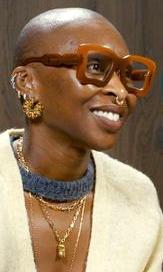 What I don’t respect, however, is how Cynthia presents herself out in public. Cynthia is a singer and LGBTQ+ activist who self-identifies as “queer” and “bisexual.” The GLAAD organization praises her as a “queer powerhouse.” According to the film’s distributor, Erivo plays Elphaba as a “passionate political activist.”
What I don’t respect, however, is how Cynthia presents herself out in public. Cynthia is a singer and LGBTQ+ activist who self-identifies as “queer” and “bisexual.” The GLAAD organization praises her as a “queer powerhouse.” According to the film’s distributor, Erivo plays Elphaba as a “passionate political activist.”
She has said, “Elphaba’s story is the cautionary tale of what it can sometimes mean to have to stand in your individuality, your otherness, even when systems of oppression are set against you. …I encourage you to keep rebelling…” (The Hollywood Reporter).
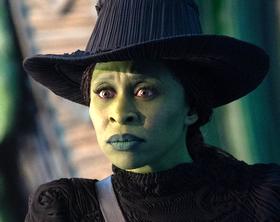 Cynthia Erivo recently received an award from the Los Angeles LGBT Center, at a gala that raised $1.6 million for the organization. During the ceremony she said, “Elphaba’s story is…about how a colourful, powerful, magical woman — despite being disparaged, demonized, and discriminated against — becomes a hero… WICKED is a reclamation and a reimagining of the labels used against her. It is the proclamation of her right to exist in all her power. If that sounds familiar to you colourful, magical people in this room — it should.”
Cynthia Erivo recently received an award from the Los Angeles LGBT Center, at a gala that raised $1.6 million for the organization. During the ceremony she said, “Elphaba’s story is…about how a colourful, powerful, magical woman — despite being disparaged, demonized, and discriminated against — becomes a hero… WICKED is a reclamation and a reimagining of the labels used against her. It is the proclamation of her right to exist in all her power. If that sounds familiar to you colourful, magical people in this room — it should.”
This is not someone that should be idolized or praised in the public eye. She could just be a very talented actress with a great career without having to shout from the rooftops her political and sexuality-based messages. It’s interesting that in a lot of films today, the LGBTQIA+ messaging is more subtle and hidden than in past films (well Disney certainly doesn’t keep it subtle anymore). It’s a problem that will no doubt define generations to come: from children to adults. We shouldn’t be going around saying “Hey everyone, denying how God made you is okay! If you feel like a girl, become a girl. If you feel like a boy, become a boy. Who cares who you were born as?”
This is rhetoric that sounds silly, but then you start to hear politicians, local and national, using the same language, the same verbiage, and then you wonder, “What has happened to us? Where’s tradition? Where’s God found in this?”
Then of course, there was the huge outburst Cynthia made when a fan made an AI recreation of the famous Wicked stage musical poster (the whispering poster) with Cynthia and Ariana making the pose instead. She became furious and stated that she felt insulted and blah blah blah. Really, it’s unbecoming to see an adult throw a tantrum.
Pacing and Other Elements
As a musical film, it is a tad long. 2 hours and 40 minutes for JUST the first act is simply WAY TOO LONG. The entire original stage musical was only 5 minutes longer, and the first act was only 1 hour 30 minutes. The film nearly doubled the length of the first act by drawing out scenes, extending scenes, adding scenes, adding more to the musical numbers, etc. There were times I found myself checking my watch, which I would NEVER do while viewing the stage musical.
Additionally there are some performances that really don’t impress me that much. The actors who played Boq Woodman (who gets very little screen time) and Fieyro really put on flat performances. Fiyero Tigelaar comes off more shallow than anything else. Boq comes off as just, well, silly and naive.
Content of Concern
SEXUAL CONTENT: Elphaba’s mother, Melena, is seen having an affair and passionately kissing another man while her husband is away (they begin to have sex but the camera pans away before they do). However, it is implied that Melana was raped by her secret lover. An effeminate (or possibly Gay individual) asks a male character “Enroll here much?” in an attempt to flirt with him. In fact, this male character is loved and adored by both men and women (something that was NOT in the original stage musical by the way). Some of Galinda (Glinda?) outfits can be a bit revealing: some are slightly see-through (in one scene where she holds onto a ceiling lamp, her underwear can be seen), some are too short and some show some cleavage. Some male characters’ outfits resemble skirts.
OCCULTIC CONTENT: Of course, you can expect a movie about the future Wicked Witch of the West to have, well, witchcraft. Elphaba’s powers are controlled by her emotions. While her powers are fairly harmless at first, toward the end of the film they become powerful and lead to moments with unintended consequences. In fact, one of these moments is where Elphaba reads from an ancient sorcery book (supposedly this book was the basis in the creation of all the magic in Emerald City), and the spells she enacts cause creatures to develop wings (that really shouldn’t have wings). A couple characters are seen using magic to fix or control situations, such as controlling the weather.
WOKENESS: There is subtle LGBTQIA+ messaging in moments throughout the film. Some overlying messages are about racism. In fact, here is some interesting information about the author and the origins of the musical itself from Christian Spotlight…
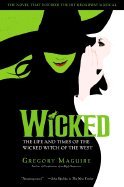 The musical and film are based on the 1995 novel by Gregory Maguire, Wicked: the Life and Times of the Wicked Witch of the West, a book that was unsuccessful until the Broadway musical made it famous.
The musical and film are based on the 1995 novel by Gregory Maguire, Wicked: the Life and Times of the Wicked Witch of the West, a book that was unsuccessful until the Broadway musical made it famous.
Author Gregory Maguire is Gay and married to a man; they have adopted 3 children. His beliefs include moral relativism, intersectionality, animal rights, etc. His views appear in both his novel and the resulting film.
His revisionist woke allegorical novel portrays the traditionally Wicked Witch of the West as the good guy, not the bad. He has said that his novel Wicked is primarily about identifying with someone who is ostracized and labeled evil. She is initially treated poorly by common people due to her skin color. He uses her journey to explore the “nature versus nurture” debate, as well as themes of propaganda, terrorism, and life purpose.
VIOLENCE: Mild to Moderate, some may scare young ones
A giant hot air balloon’s ropes snap and causing a falls down several stories killing the guards. We witness several monkeys undergoing a very painful transformation, and we hear them cry out in pain. A man falls over dead with a heart attack. Oz, we learn, is guarded by monkeys that are quite fearsome. Scenes in the Wizard’s castle involving those animals could—like the original Wizard of Oz—be scary for little viewers.
Two characters are seen being chased by guards. The guards try and grab and capture the two female characters, with some success. Characters smash through huge glass windows on the top of a tall tower. Elphaba nearly falls to the ground several stories below. Kids tease and throw rocks at a girl. Armed guards clash with flying animals. Someone mentions that a character was killed by a little girl with a bucket of water. A character’s wickerman statue is burned by the munchkins in celebration of a character’s demise. In a moment where someone’s magic is unchecked, their magic causes objects in a square to make almost everything fly, causing people to panic and duck. A talking goat is taken away by force by Ozian guards to be locked in a cage and become domesticated and unable to speak.
ATTITUDE: There is discrimination based on skin color. One character states to the incoming students that I have “high hopes… for some of you.” The song “No One Mourns the Wicked” is all about the joy these people have over the death of a character. Galinda offers to help Elphaba change the color of her skin (later another character offers the same). The song “Loathing” is all about two people hating each other without real reason. Galinda gives Elphaba the signature witch’s hat in an attempt to embarrass her at a party. People are seen laughing and avoiding Elphaba at all costs. There is a story shared about how a character came to be (not a happy tale). A message is painted on the back of Dr. Dillamond’s (Peter Dinklage) chalkboard (he’s the talking goat/history professor); it rudely states “Animals should be seen, not heard.”
DRUGS: In another moment where magic goes haywire, a ton of poppy flowers fly around the room and drug the students, making them go into a temporary deep sleep. Elphaba’s mom drinks a green liquor, and after Elphaba is born the nurses take a swig of liquor (normal color).
Messsage
The primary message the film tries to discuss is, again, about judging others by their appearance. At first, Elphaba is despised by everyone, simply because of her skin color. Over time, people realize who Elphaba is on the inside: misunderstood and actually a decent person to be around (again, this is the film’s portrayal).
Judging others unfairly is a sin, plain and simple. Only God knows an individual’s heart, even the hearts of society’s most unlikeable people (murderers, rapists, etc.). Scripture is clear…
“Brothers and sisters, do not slander one another. Anyone who speaks against a brother or sister or judges them speaks against the law and judges it. When you judge the law, you are not keeping it, but sitting in judgment on it.” —James 4:11 NIV
“You, therefore, have no excuse, you who pass judgment on someone else, for at whatever point you judge another, you are condemning yourself, because you who pass judgment do the same things. Now we know that God’s judgment against those who do such things is based on truth. So when you, a mere human being, pass judgment on them and yet do the same things, do you think you will escape God’s judgment?” —Romans 2:1-3 NIV
But the wisdom that comes from heaven is first of all pure; then peace-loving, considerate, submissive, full of mercy and good fruit, impartial and sincere. —James 3:17 NIV
Likewise, we are NOT permitted as Christians to harbor hate in our hearts. Never.
“If we claim to have fellowship with him and yet walk in the darkness, we lie and do not live out the truth.” —1 John 1:6 NIV
“Get rid of all bitterness, rage and anger, brawling and slander, along with every form of malice.” —Ephesians 4:31 NIV
“Hatred stirs up conflict, but love covers over all wrongs.” —Proverbs 10:12 NIV
Closing Thoughts
I know I shouldn’t be, but I have mixed feelings about “Wicked.” The messages are strong, even though the source where these messages COME from (e.g., the author) are skewed. The music is enchanting (pun intended), and the performances are good, yet the film is rooted and grounded in witchcraft and sorcery.
As a firm believer of Christ, I can’t recommend the film because of the significant role witchcraft plays in it. Ultimately, though, it is up to you to decide whether or not you will take yourself or your children to the film. All I can say is some moments in the film are delightful while others are just, well, WICKED.
- Wokeism: Heavy
- Occult: Moderately Heavy
- Violence: Moderate
- Nudity: Mild
- Sex: Mild
- Drugs/Alcohol: Mild
- Profane or Vulgar language: None
See list of Relevant Issues—questions-and-answers.


PLEASE share your observations and insights to be posted here.


My Ratings: Moral rating: Better than Average / Moviemaking quality: 5